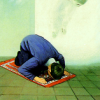
The etiquette of performing sujūd
We shall point out some of the rules of etiquette of performing sujūd as recorded in the traditions:[1]
After rukū‘ in preparation for the performance of sujūd, the hands must be placed first on the ground before the knees. During the sujūd the hands must be placed parallel to the ears. For men, the elbows must not be placed on the ground and must remain open on both sides like wings. Not only the forehead but also the nose must be placed on the ground. In between the two prostrations, the person praying must place his left foot under the right foot in such a manner that the weight of his body is on the left side because the left is the symbol of falsehood while the right is the symbol of truth.
During sujūd the person praying, apart from the obligatory recital, has to send ṣalāwah, supplicate and weep out of fear of God. While rising from sujūd, he has to recite takbīr and during the recital of takbīr, he has to raise both his hands.
The soil of Karbalā’
Although sujūd on any ground, nay on any clean stone and wood, is permissible and correct, the soil [turbah] of Imām al-Ḥusayn has great merits. It is said that Imām aṣ-Ṣādiq (‘a) would not prostrate on anything but the soil of Karbalā’.
Sujūd on the soil of Karbalā’ tears away seven types of veils [ḥijābs] (that separate man from the Source of Light). It uplifts the prayer and makes it accepted. It also brings the person praying out of the abyss of material things, and acquaints him with jihād, blood and martyrdom.
Sujūd on the soil of al-Ḥusayn (‘a) means prayer accompanied by divine guardianship [wilāyah].
Sujūd on the soil of al-Ḥusayn (‘a) means prayer accompanied by martyrdom.
Sujūd on the soil of al-Ḥusayn (‘a) means commemorating the memory of the martyrs of Karbalā’ who offered their blood for the sake of prayer and in the way of prayer.
Sujūd on the soil of al-Ḥusayn (‘a) means that every day is ‘Ashūrā’ and everyplace is Karbalā’.
Sujūd on the soil of al-Ḥusayn (‘a) means that in the struggle against falsehood, one should offer his head and soul, but not subject himself to humiliation.
Yes, the shrine of al-Ḥusayn (‘a) is one of the gardens of heaven and one of its gate.
Supplication under the dome of al-Ḥusayn (‘a) is accepted and prayer in that place is beloved and accepted.
If the beads of a rosary [tasbīḥ] made from the soil of Karbalā’ are rotated in the hands, there shall be the reward of reciting “subḥān Allāh” [glory be to Allah] for the owner even if he is silent. If he does dhikr [the remembrance of God] and uses the rosary, there shall be 70 times the reward for each dhikr.
The importance of Karbalā’ as mentioned in the traditions is not concealed so as for it to encompass so far as four miles away from the shrine of Imām al-Ḥusayn (‘a).[2]
Prostration of thanks [sujūd shukr]
Prostration is not exclusive to prayer. In fact, it is also discussed in other areas and it is even obligatory sometimes such as after the recital of one of the verses for which prostration is obligatory.
One of the ways of expressing gratitude is the prostration of thanks [sujūd shukr] which is highly recommended.
Sujūd shukr means giving thanks for the incessant divine blessings which have been showered upon us and our family.
Imām aṣ-Ṣādiq (‘a) says: “Whenever you remember a blessing, place your forehead on the ground as a token of thanks and if you see that the people are looking at you, as a respect for that favor, bend a little bit.”[3]
The Holy Prophet (ṣ) was seen dismounting a camel. He performed prostration five times and said: “Jibra’īl came down to me and gave me five types of insight, and for every insight I made sajdah.”[4]
Ḥaḍrat ‘Alī (‘a) sometimes would faint while performing sujūd shukr[5] and it has been narrated from the Imām of the Time (‘a) that the most necessary of the recommended acts [sunnah] is sujūd shukr.[6]
During the sujūd shukr any dhikr or supplication is permissible, but the recital of “shukran lillāh” [thanks to Allah] and “al-ḥamdulillāh” [all praise belongs to Allah], and remembrance of the great blessing of the guardianship [wilāyah] of the Ahl al-Bayt (‘a) are recommended.[7] God said: “The reward of the person who performs sujūd shukr is that I also give thanks to him.”[8]
Although there is a specific time and place for sujūd shukr, the best time nevertheless is after every prayer as a supplement to the prayer.
The blessings of sujūd shukr
Many blessings and benefits of sujūd shukr have been mentioned in the traditions. We shall briefly state some of them below:
If there is deficiency in prayer which is not removed through the recommended and optional prayers, sujūd shukr will compensate for it. It entails the pleasure of God and removes the distance between man and God. Supplication during the sujūd shukr is recommended and has the reward of ten ṣalāwats and the removal of ten major sins.
Concerning the station and status of sujūd shukr, it is enough to say that God would be proud of it and express this pride to the angels.[9]
[1] These traditions have been recorded in Wasā’il ash-Shī‘ah, vol. 4, pp. 950-980.
[2] The subjects of this discussion have been recorded in the traditions of the book, Kāmil az-Ziyārāt, Section 89 onward.
[3] Al-Wāfī, vol. 8, p. 825.
[4] Muḥajjah al-Bayḍā’, vol. 1, p. 346.
[5] Jāmi‘ al-Aḥādīth, vol. 5, p. 459.
[6] Jāmi‘ al-Aḥādīth, vol. 5, p. 453.
[7] Jāmi‘ al-Aḥādīth, vol. 5, p. 469.
[8] Al-Faqīh, vol. 1, p. 334.
[9] Al-Faqīh, vol. 1, p. 331.













